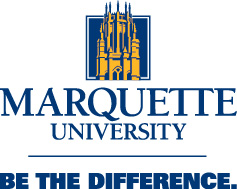|
May 13, 2020
Marquette experts provide commentary on coronavirus
President Michael R. Lovell commented on how the coronavirus pandemic has impacted the student mental health crisis. “It (college) is the most social time of your life,” President Lovell said. “To have that taken away so suddenly is a shock. For students, as for faculty members, there’s no substitute for being in a room bouncing ideas off one another. You can’t quite get the same energy in a remote-learning environment.”
Emma Brauer, senior anthropology student, added that while she tries to structure her days with walks and connecting with friends virtually, she misses “the physical aspect of being in the classroom.”
Story appeared in the Chronicle of Higher of Education, May 11, 2020
President Lovell also participated in the Metro Milwaukee Association of Commerce’s daily briefing where he discussed how the university is navigating financial and other uncertainties presented by the pandemic, including working with a COVID-19 response team of 100 campus experts. “Essentially we have to rely on both the health care experts and government agencies to give us the guideline and parameters for what we do," President Lovell said. "One thing we’ve been told is the CDC is most likely going to put out some guidelines around returning to the classroom and also residence halls.”
Story appeared in the Milwaukee Business Journal, May 6, 2020
Dr. Charles Franklin, director of the Marquette University Law School Poll, offered insight on the pandemic and voter attitudes in a swing state. “We're seeing some decline in people saying they're worried about the virus, worried about getting it themselves,” Franklin said. “But we're also seeing people now thinking this won't be back to normal for at least into the fall if not beyond that. That's a shift. People were much more optimistic about how quickly it would be decided earlier.”
Story aired on NPR, May 10, 2020
Kiley Peters, adjunct instructor of strategic communication in the Diederich College of Communication, wrote a story for Milwaukee Magazine about best practices for working from home. Peters’ tips include establishing a routine, creating various workspaces, embracing videoconferencing and more. “I think it (working remotely) is super productive,” Peters wrote. “It provides the most flexible work/life balance you could ask for, you don’t waste time commuting, you save money on lunches, you name it, I think it’s great.”
Story appeared in Milwaukee Magazine, May 11, 2020
Dr. Jessica Rich, assistant professor of political science in the Klingler College of Arts and Sciences, wrote an op-ed about the battle between Brazil’s government and its public health system regarding the country’s response to the pandemic. “While many world leaders have imposed lockdowns or stay-at-home orders, President Jair Bolsonaro has launched a $1 million advertising campaign against social distancing — encouraging people to go to church and businesses to stay open,” Rich wrote.
Opinion piece appeared in the Washington Post, May 4, 2020
Similar stories appeared on Aljazeera and New York Public Radio, May 6, 2020
University action on coronavirus
Universities work to combat financial impact of pandemic
A letter from Marquette leaders to the campus community was cited in an America story about the efforts of Catholic colleges and universities to avert the financial downturn presented by the pandemic. “Our future financial health depends on the demand for online Summer Studies, our ability to virtually recruit next year’s incoming class and how Marquette and other private universities will benefit from a government stimulus package,” the letter reads. “We are exploring all scenarios and financial models, and we promise to communicate with you frequently.”
Story appeared in America, May 7, 2020
Marquette in the news
Dr. Elizabeth Angeli, assistant professor of English in the Klingler College of Arts and Sciences, was profiled for winning Best Book in Technical or Scientific Communication from the Conference on College Composition and Communication for her book Rhetorical Work in Emergency Medical Services: Communicating in the Unpredictable Workplace. “It took me a long time to realize it, but I am glad to be able to help these agencies and departments as it has become my passion,” she said. “This Jesuit emphasis on cross-disciplinary thinking and training has prepared me to expand my field.”
Story appeared in the Catholic Herald, May 6, 2020
Athletic and Human Performance Research Center wins real estate award
The AHPRC received an honorable mention as part of the Milwaukee Business Journal’s Best in Real Estate Awards. The honorable mention is part of the Best New Development in the education category.
Story appeared in the Milwaukee Business Journal, May 7, 2020
Dr. Shion Guha, assistant professor of computer science in the Klingler College of Arts and Sciences, discussed his research findings that show decision making algorithms used by the United States Child Welfare System to make unbiased, evidence-based decisions about child placement and predicting risk of maltreatment do not improve the lives of foster children. “CWS should actively focus on approaches that disrupt the status quo and seek to improve the lives of foster children,” Guha said. “Through human-centered participatory design, we can begin to see a shift in focus to other well-documented outcomes such as Child-Foster Parent Matching.”
Story appeared in the Milwaukee Independent, May 6, 2020
Dr. Doug Fisher, associate professor emeritus of practice in the College of Business Administration, commented on the shortage of thermometers amid the pandemic. "Eighty percent-plus, perhaps 90 percent of all global electronics are made in China," Fisher said. “It (the coronavirus) hit at the same time China was pulling back their production. They had to shut down quite a bit, as well."
Story aired on WITI-TV (FOX 6), May 6, 2020

|